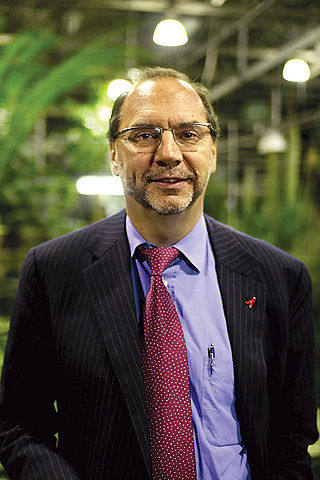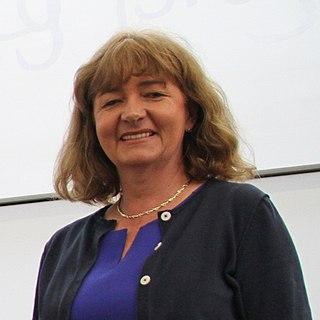
Sir Ronald Ross was a British medical doctor who received the Nobel Prize for Physiology or Medicine in 1902 for his work on the transmission of malaria, becoming the first British Nobel laureate, and the first born outside Europe. His discovery of the malarial parasite in the gastrointestinal tract of a mosquito in 1897 proved that malaria was transmitted by mosquitoes, and laid the foundation for the method of combating the disease.

The London School of Hygiene & Tropical Medicine (LSHTM) is a public research university in Bloomsbury, central London, and a member institution of the University of London that specialises in public health and tropical medicine.

Sir Peter Karel, Baron Piot, is a Belgian-British microbiologist known for his research into Ebola and AIDS.
Sir Roy Malcolm Anderson is a leading international authority on the epidemiology and control of infectious diseases. He is the author, with Robert May, of the most highly cited book in this field, entitled Infectious Diseases of Humans: Dynamics and Control. His early work was on the population ecology of infectious agents before focusing on the epidemiology and control of human infections. His published research includes studies of the major viral, bacterial and parasitic infections of humans, wildlife and livestock. This has included major studies on HIV, SARS, foot and mouth disease, bovine tuberculosis, bovine spongiform encephalopathy (BSE), influenza A, antibiotic resistant bacteria, the neglected tropical diseases and most recently COVID-19. Anderson is the author of over 650 peer-reviewed scientific articles with an h-index of 125.
Peter George Smith CBE BSc DSc HonMFPHM FMedSci, is an eminent epidemiologist and Professor of Tropical Epidemiology at the London School of Hygiene and Tropical Medicine (LSHTM).

Sir Alimuddin Zumla,, FRCP, FRCPath, FRSB is a British-Zambian professor of infectious diseases and international health at University College London Medical School. He specialises in infectious and tropical diseases, clinical immunology, and internal medicine, with a special interest in HIV/AIDS, respiratory infections, and diseases of poverty. He is known for his leadership of infectious/tropical diseases research and capacity development activities. He was awarded a Knighthood in the 2017 Queens Birthday Honours list for services to public health and protection from infectious disease. In 2012, he was awarded Zambia's highest civilian honour, the Order of the Grand Commander of Distinguished services - First Division. In 2023, for the sixth consecutive year, Zumla was recognised by Clarivate Analytics, Web of Science as one of the world's top 1% most cited researchers. In 2021 Sir Zumla was elected as Fellow of The World Academy of Sciences.
Valerie Ann Curtis was a British scientist who was Director of the Environmental Health Group at the London School of Hygiene and Tropical Medicine. This is a multidisciplinary group dedicated to improving hygiene, sanitation and water in households and schools through enhancing knowledge.

Sarah Cleaveland is a veterinary surgeon and Professor of Comparative Epidemiology at the University of Glasgow.
Polly Roy OBE is a professor and Chair of Virology at The London School of Hygiene and Tropical Medicine. She attended a number of schools which included Columbia University Medical School, Rutgers University, University of Alabama, and University of Oxford. In 2001 she became a part of The London School of Hygiene and Tropical Medicine and, along with being the chair of Virology, is also the co-organiser of the medical microbiology course. The virus that she has dedicated most of her career to is Bluetongue disease that affects sheep and cattle. She became interested in this virus after attending a symposium and was intrigued by the fact that not much was known about the virus that was causing such a nasty and sometimes fatal disease.

John Payne Woodall (1935–2016), known as Jack Woodall, was an American-British entomologist and virologist who made significant contributions to the study of arboviruses in South America, the Caribbean and Africa. He did research on the causative agents of dengue fever, Crimean–Congo hemorrhagic fever, o'nyong'nyong fever, yellow fever, Zika fever, and others.
Eleanor Mary Riley was Director of the Roslin Institute, Dean of Research at the Royal (Dick) School of Veterinary Studies, and professor of Immunology at the University of Edinburgh. Her research focusses on understanding the immune response of the host to malaria and other diseases using human data and mouse models.

Sir Christopher John MacRae Whitty is a British epidemiologist, serving as Chief Medical Officer for England and Chief Medical Adviser to the UK Government since 2019.
Elizabeth Lucy Corbett is a British epidemiologist who is Professor of Tropical Epidemiology at the London School of Hygiene & Tropical Medicine. Her research investigates the regulation of tuberculosis in HIV prevalent populations and improving access to HIV self-testing.

Neil Morris Ferguson is a British epidemiologist and professor of mathematical biology, who specialises in the patterns of spread of infectious disease in humans and animals. He is the director of the Jameel Institute, and of the MRC Centre for Global Infectious Disease Analysis, and head of the Department of Infectious Disease Epidemiology in the School of Public Health and Vice-Dean for Academic Development in the Faculty of Medicine, all at Imperial College London.
Hazel Marguerite Dockrell is an Irish-born microbiologist and immunologist whose research has focused on immunity to the human mycobacterial diseases, leprosy and tuberculosis. She has spent most of her career at the London School of Hygiene and Tropical Medicine, where as of 2020 she is a professor of immunology. She was the first female president of the Royal Society of Tropical Medicine and Hygiene. Jimmy Whitworth of the Wellcome Trust describes her as "a marvellous ambassador for global health and research."
Azra Catherine Hilary Ghani is a British epidemiologist who is a professor of Infectious Disease Epidemiology at Imperial College London. Her research considers the mathematical modelling of infectious diseases, including malaria, bovine spongiform encephalopathy and coronavirus. She has worked with the World Health Organization on their technical strategy for malaria. She is associate director of the MRC Centre for Global Infectious Disease Analysis.
The Scientific Advisory Group for Emergencies (SAGE) is a British Government body that advises central government in emergencies. It is usually chaired by the United Kingdom's Chief Scientific Adviser. Specialists from academia and industry, along with experts from within government, make up the participation, which will vary depending on the emergency. SAGE gained public prominence for its role in the 2020 COVID-19 pandemic in the United Kingdom.
Sir William John Edmunds is a British epidemiologist, and a professor in the Faculty of Epidemiology and Population Health at the London School of Hygiene & Tropical Medicine.
Stephen James Weston Evans is a British pharmacoepidemiologist and medical statistician, as of 2020 professor of pharmacoepidemiology at the London School of Hygiene & Tropical Medicine (LSHTM).

Julie Lydia Fitzpatrick is a Scottish scientist and academic. She is the CEO of Moredun Research Institute and Scotland's part-time Chief Scientific Advisor. She attended Scientific Advisory Group for Emergencies meetings in that role.








